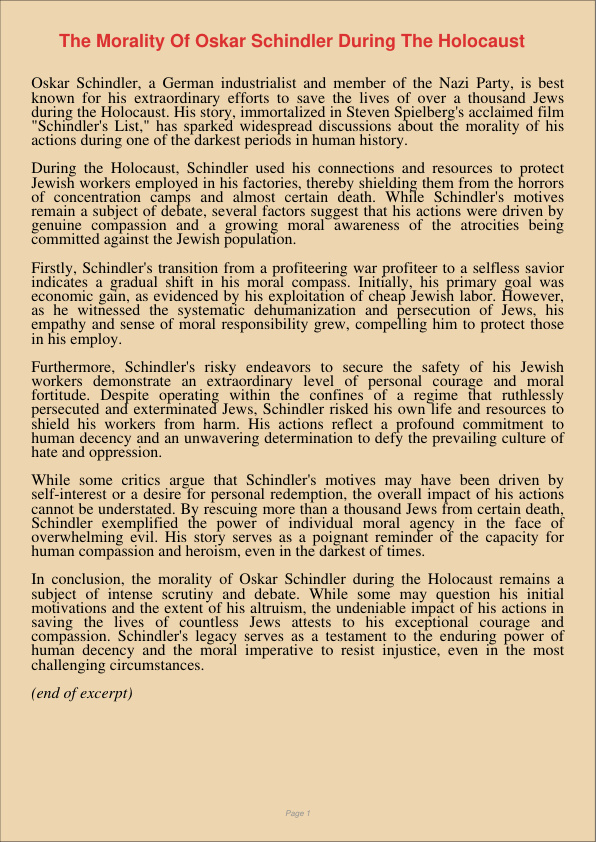The Morality Of Oskar Schindler During The Holocaust
Dec 31, 2023
oskar schindler
morality
Macro & Microeconomics
Nursing

Oskar Schindler, a German industrialist and member of the Nazi Party, is best known for his extraordinary efforts to save the lives of over a thousand Jews during the Holocaust. His story, immortalized in Steven Spielberg’s acclaimed film “Schindler’s List,” has sparked widespread discussions about the morality of his actions during one of the darkest periods in human history.
During the Holocaust, Schindler used his connections and resources to protect Jewish workers employed in his factories, thereby shielding them from the horrors of concentration camps and almost certain death. While Schindler’s motives remain a subject of debate, several factors suggest that his actions were driven by genuine compassion and a growing moral awareness of the atrocities being committed against the Jewish population.
Firstly, Schindler’s transition from a profiteering war profiteer to a selfless savior indicates a gradual shift in his moral compass. Initially, his primary goal was economic gain, as evidenced by his exploitation of cheap Jewish labor. However, as he witnessed the systematic dehumanization and persecution of Jews, his empathy and sense of moral responsibility grew, compelling him to protect those in his employ.
Furthermore, Schindler’s risky endeavors to secure the safety of his Jewish workers demonstrate an extraordinary level of personal courage and moral fortitude. Despite operating within the confines of a regime that ruthlessly persecuted and exterminated Jews, Schindler risked his own life and resources to shield his workers from harm. His actions reflect a profound commitment to human decency and an unwavering determination to defy the prevailing culture of hate and oppression.
While some critics argue that Schindler’s motives may have been driven by self-interest or a desire for personal redemption, the overall impact of his actions cannot be understated. By rescuing more than a thousand Jews from certain death, Schindler exemplified the power of individual moral agency in the face of overwhelming evil. His story serves as a poignant reminder of the capacity for human compassion and heroism, even in the darkest of times.
In conclusion, the morality of Oskar Schindler during the Holocaust remains a subject of intense scrutiny and debate. While some may question his initial motivations and the extent of his altruism, the undeniable impact of his actions in saving the lives of countless Jews attests to his exceptional courage and compassion. Schindler’s legacy serves as a testament to the enduring power of human decency and the moral imperative to resist injustice, even in the most challenging circumstances.